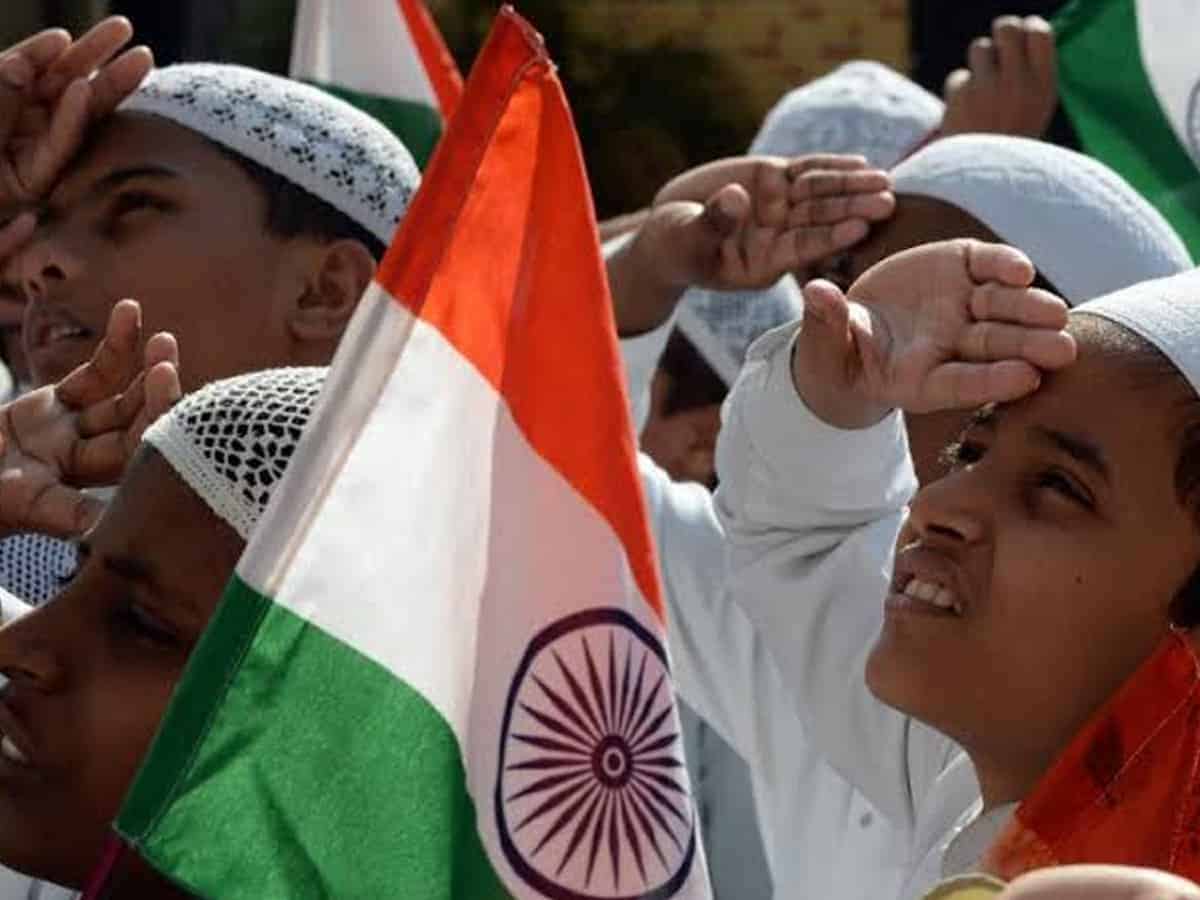By Safoora Nuzhath,
NEW DELHI: Muslim religious minority in India is facing targeted attacks by the right-wing extremists who suspect their loyalty to the country and and paint them as anti-India.
However, the history of India’s Independence struggle will be incomplete without the mention of the role played by Muslims and those who used powerful Urdu language to articulate the mood of the people. Patrotic slogans and songs were coined to enliven protest meetings.
Some of them became timeless. Some of the poems and songs written in the 19th and 20th century are as relevant today as in the times when they were created.
‘Sarfaroshi Ki Tamanna’ written by Ram Prasad Bismil as a freedom war cry during the British Raj period. The meaning of Bismil is the one who is hurt or injured.
The famous slogan Inquilab Zindabad translates to “Long Live the Revolution!” which was first used in 1929 by Bhagat Singh was in fact given by freedom fighter and poet Hasrat Mohani.
Father of the slogan “Jai Hind” is Major Abid Hasan Safrani of the Indian National Army. ‘Jai Hind’ is a shortened version of ‘Jai Hindustan Ki.’ Safrani was a close associate of Subhash Chandra Bose.
In his book “Lengendotes of Hyderabad”, former civil servant Narendra Luther said Hasan suggested ‘Jai Hind’, an Indian form of greeting for the army. Perhaps that is the reason many believe that Subhash Chandra Bose coined that slogan.
Earlier in 2017, Supreme Court lawyer and prominent civil rights activist Prashant Bhushan exposed the so-called nationalists through his tweet on the role of Muslims in freedom struggle.
The jittery Hindutva organisations trolled him for linking religion with patriotism.
As we are about celebrate our 71st Republic Day, let’s take a look at some Muslim contribution to patriotic songs in India over the years.
The list is not exhaustive and includes only the most popular ones.
1 ‘Sare jahan se achha’ was written by Allama Iqbal. The immortal Urdu poem has been sung by many singers over the years, including a duet by Mohammed Rafi and Asha Bhosle for Dharamputra (1961).
2 ‘Watan ki raah mein watan ke naujawaan shaheed hon’ from the Dilip Kumar starrer Shaheed (1948). The lyric of Qamar Jalalabadi was sung by Mohd Rafi, to Ghulam Haider’s tune is popular even after 64 years of the film’s release.
3 ‘Ye desh hai veer jawano ka’ from the movie Naya Daur (1957). Sahir Ludhianvi’s lyrics sung by Rafi and is also picturised delightfully on Dilip Kumar.
4 ‘Desh ka pyara’ from the lesser known movie Masoom (1960). Raja Mehdi Ali Khan wrote the lyrics of this lovable children song.
5 ‘Insaaf ki dagar pe’ from the movie Ganga Jamuna. The 1961 classic had this gem penned by Shakeel Badayuni with music by Naushad.
6 ‘Nanha munna rahi hoon’ from Mehboob’s Son of India (1962). The duo of Naushad and Shakeel again behind this endearing effort.
7 ‘Ab tumhare hawale watan sathiyon’ from the National Award winning movie Haqeeqat (1964), remains the most definite account of war portrayal on the Indian screen. The moving lyrics by Kaifi Azmi were given a soulful rendition by Mohd Rafi. A timeless classic.
8 ‘Apni aazaadi ko hum’ from the movie Leader (1964). Rafi, Shakeel and Naushad teams up for this winner. The song, written by Shakeel Badayuni, composed by Naushad, and sung by Rafi. Dilip Kumar adds his aura to the on screen portrayal.
The following are the few recent songs.
10 ‘Sandese aate hain’ from Border (1997). Anu Malik provided the music for the song written by Javed Akhtar.
11‘Maa tujhe salam’ from the 1997 studio album Vande Mataram by music Maestro AR Rahman Rahman.
Rahman composed the tune for Mehboob’s lyrics, and then sang it with passion. It remains the most influential patriotic song of the modern era.
The track also holds two Guinness World Records for being the song performed in the most number of languages.
The album was met with overwhelming responses. The album sold over 500,000 copies in the first week, and over 1.5 million copies in India during 1997 alone
Till date it’s the largest Indian non-film album internationally.
12 ‘Zindagi maut na ban jaaye’ from Sarfarosh (1999). The immensely popular number from the critically acclaimed Amir Khan starrer was written by Israr Ansari.
13 ‘Ye jo des hai tera’ from the Shahrukh Khan starrer Swades (2004). A beautifully sung and composed number by Rahman with lyrics from Javed Akhtar.
14 ‘Sarfaroshi Ki Tamanna’ – the revolutionary Urdu masterpiece was brought to life by Rafi, Dey and Rajendra Mehta in Shaheed (1965).
A.R. Rahman gave his touch to the lyrics, first in The Legend of Bhagat Singh (2002) and backed it with a powerful rendition by Amir Khan in the cult classic Rang De Basanti (2006). The screenplay was written by Anjum Rajabali.
15 The title track of ‘Chak de India’, which has become the national anthem for sports in India was written by Jaideep Sahni, composed by Salim-Sulaiman and Sung by Sukhwinder Singh.
16 ‘Rang de basanti’ from the movie Rang De Basanti is a peppy and relevant number for the youth of today. Naturally it was Rahman’s music.














